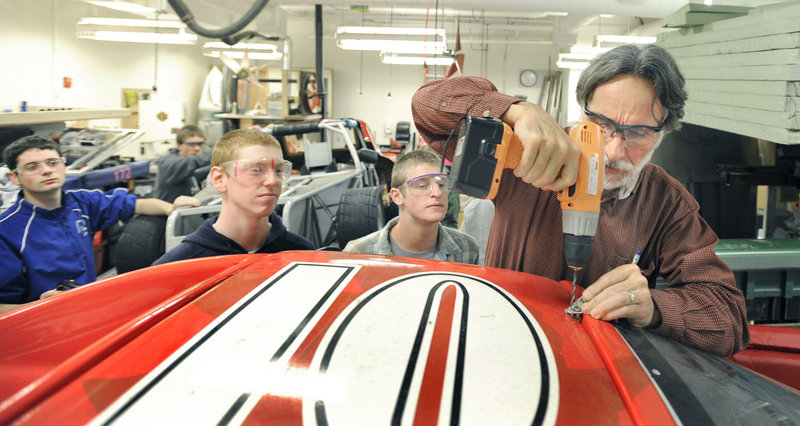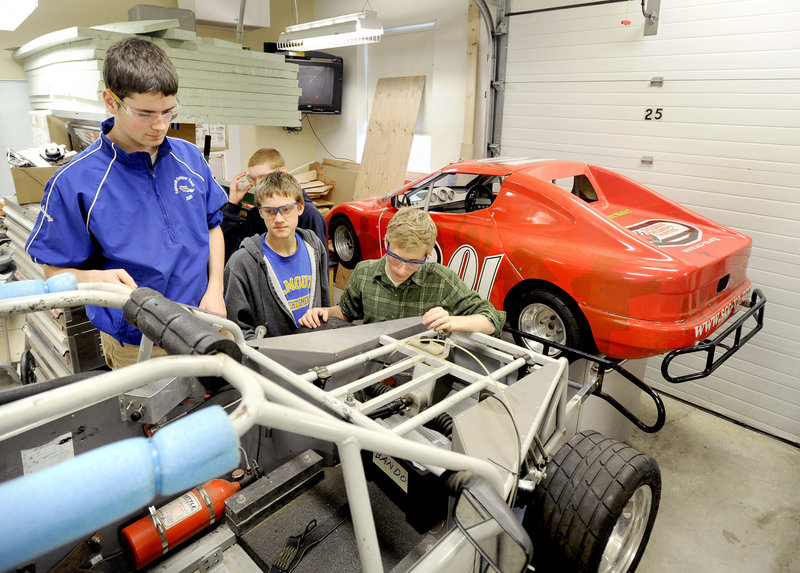FALMOUTH – Perched on work tables in a classroom at Falmouth High School, two small, battered race cars hold the promise of learning experiences to come.
If all goes as planned, students will be driving them at Beech Ridge Motor Speedway in Scarborough by springtime, and they could be racing against students from other Maine high schools in the future.
Students in Falmouth’s advanced engineering class are fixing up one of the gas-powered junior race cars, known as “bandoleros,” and will install an electric motor in the other. They plan to race the cars next spring to see which one performs better.
The grant-funded project is providing opportunities to practice math, science, technology and communication skills. And because the project includes a popular sport, enrollment in the class doubled this year, to 18 students.
“Working on race cars was a real carrot for the students,” said teacher John Kraljic. “It’s exciting, it’s fun and it’s real.”
The advanced engineering class is an upper-level elective taught by Kraljic, a technology teacher, and Andrew Njaa, a physics teacher. Students take the class, in addition to required math and science courses, after they have completed introductory electives such as pre-engineering and technical drawing.
They apparently don’t mind the extra work. Many have been spending long hours outside school researching various aspects of the race car project.
“There aren’t many people in high school who get to do something so cool and real-world as this,” said Tim Hanley, a senior in the class who plans to study engineering or architecture in college.
In the months ahead, students will research, design, install and test the electric motor to make sure the car can reach speeds of 50 to 60 mph, and possibly beat the gas-powered car in 15 laps.
They will plan the installation from scratch, striving to place the new motor and batteries in optimum positions to help the car reach maximum speed and machining custom parts from raw metal. Next year, students will convert the second race car to electric power.
“It’s not just about doing equations, it’s about actually using them,” Njaa said. “They’ll experience what a NASCAR pit crew experiences during a race. You can’t predict what the challenges will be, and that makes it a lot more fun for us as teachers, too.”
If this year goes well, Njaa and Kraljic plan to take the race cars on the road and give demonstrations at other Maine high schools. They hope to develop a racing circuit of teachers and students across the state who have similar interests in math, science and technology in motion.
Falmouth’s project will cost taxpayers nothing extra. Njaa and Kraljic received a highly competitive, $10,000 Toyota Tapestry grant, provided by the auto maker through the National Science Teachers Association. They used $6,000 to buy the race cars and will use the rest to buy parts, supplies and fuel.
Morong Falmouth donated an additional $4,500 so the students could buy an enclosed trailer that will hold both cars, which measure 4 feet by 11 feet and weigh 550 pounds each. Hanley wrote the grant proposal, and several other students presented it to Morong representatives. Interstate Trailer Sales of Topsham gave the students “a good deal” on the trailer, Njaa said.
Beech Ridge Motor Speedway donated 10 days of track time, which is worth $20,000, Njaa said. The class will spread the track time over 20 days to maximize testing and racing opportunities.
The Bearings Specialty Co. in Westbrook donated some custom parts, and the Falmouth Education Foundation funded the purchase of two racing helmets, which the students researched to make sure they got the safest models.
Njaa said safety will be a major concern throughout the project. The cars are designed to be driven by children ages 10 to 14. Each one has a heavy steel-reinforced roll cage and rides low to the ground, so accidents and injuries are rare, Njaa said.
Still, students will need parents’ permission to drive the cars, and raceway officials will help address other safety issues, Njaa said.
So far, the project is generating an excitement for learning that’s uncommon in many classrooms. Sarah Collmus, one of three girls in the class, is a senior who’s a member of the robotics team and plans to study mechanical engineering in college.
“I really like math and science, and I absolutely love building and machining stuff,” she said. “I can’t wait to drive one of the cars.”
Staff Writer Kelley Bouchard can be contacted at 791-6328 or at:
kbouchard@pressherald.com
Send questions/comments to the editors.




Success. Please wait for the page to reload. If the page does not reload within 5 seconds, please refresh the page.
Enter your email and password to access comments.
Hi, to comment on stories you must . This profile is in addition to your subscription and website login.
Already have a commenting profile? .
Invalid username/password.
Please check your email to confirm and complete your registration.
Only subscribers are eligible to post comments. Please subscribe or login first for digital access. Here’s why.
Use the form below to reset your password. When you've submitted your account email, we will send an email with a reset code.